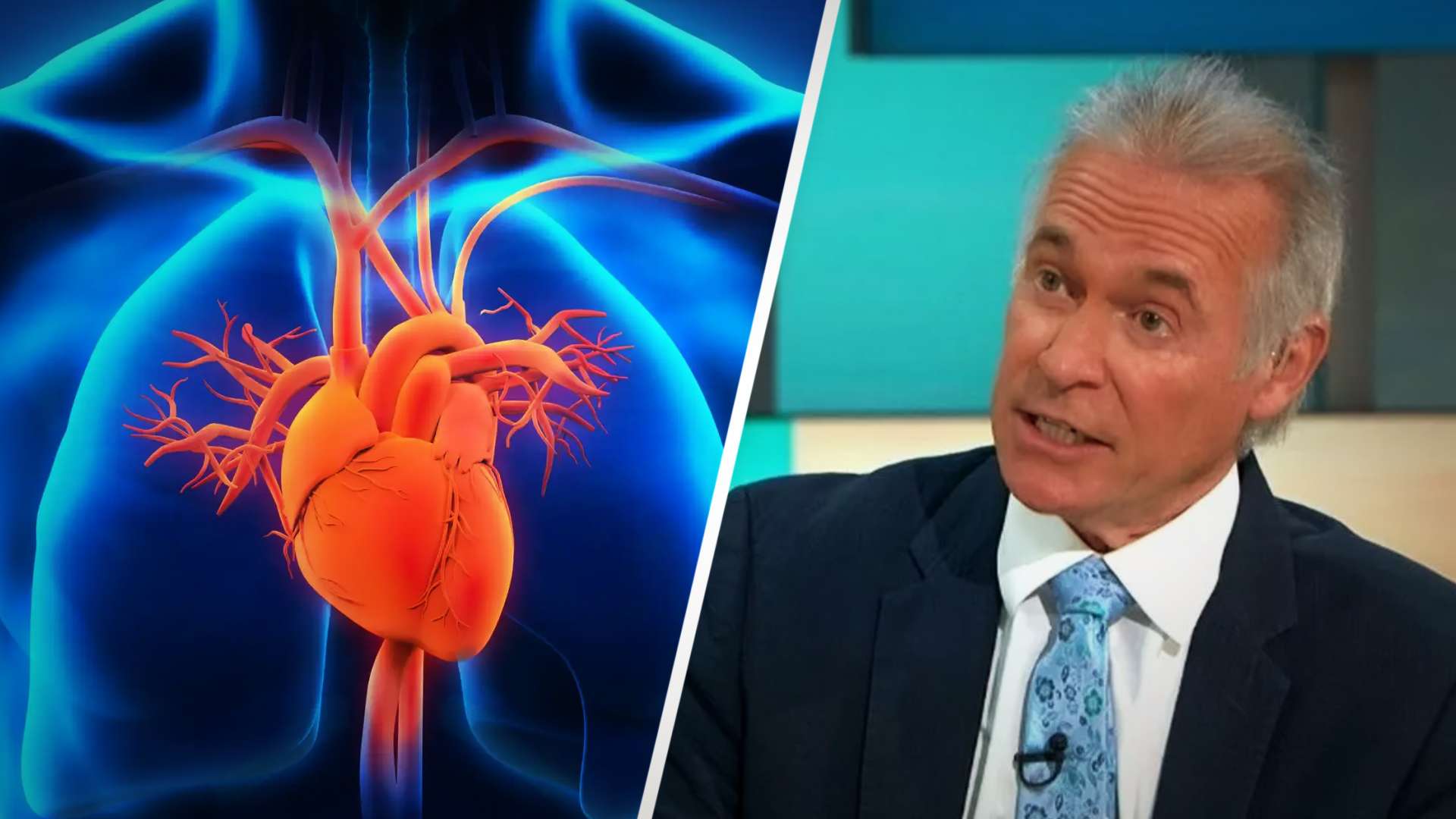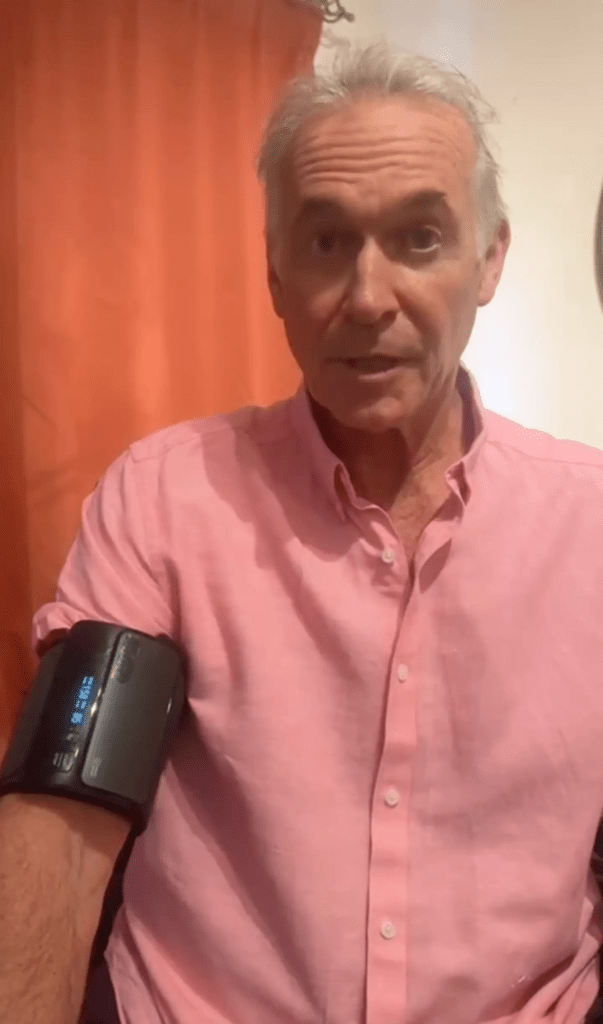Double Trouble: Doctor’s Urgent Warning on This Habit That Doubles Heart Attack Risk

A Wake-Up Call for Heart Health
Dr. Hilary Jones, a celebrated British TV doctor, has raised the alarm on a widespread habit that could drastically elevate the chances of a heart attack. His recent Instagram video on Healthspan’s profile captivated audiences by using a life-sized heart model to illustrate the importance of heart care.
“Take a look at this; this is exactly what your heart looks like,” Dr. Jones explained. He encouraged viewers to appreciate the heart’s role, emphasizing its constant work to keep us alive. Given its critical function, Dr. Jones stressed the significance of proactive care.
Maintaining heart health requires understanding and addressing various risk factors. Many people take their heart for granted, not realizing the extent of damage that unhealthy habits can cause over time. Dr. Jones’s message is clear: small, consistent efforts can make a massive difference in heart health outcomes.
In a world where heart diseases are becoming increasingly common, understanding and adopting heart-friendly practices are essential. Dr. Jones’s demonstration not only served as an educational moment but also as a call to action for viewers to take heart health seriously.

Key Factors in Heart Health
Dr. Jones underscored that keeping our hearts healthy is fundamentally linked to two primary aspects: maintaining a healthy weight and eliminating risky behaviors. He delved into the specifics:
- Weight Management: “Don’t strain your heart by carrying too much weight. Exercise it regularly—it’s a muscle, and it loves a bit of exercise,” he advised. Excess weight can lead to various health issues, including high blood pressure and diabetes, which are risk factors for heart disease. Incorporating physical activities like walking, cycling, or swimming can help shed those extra pounds, making it easier for the heart to function effectively.
- Cholesterol Control: High cholesterol is a silent enemy. Dr. Jones warned against “clogging up your heart” with excess cholesterol, which can lead to the formation of plaque in arteries, increasing the risk of heart attacks and strokes. He suggested regular monitoring of cholesterol levels and adopting a diet rich in fruits, vegetables, whole grains, and lean proteins.
Understanding these key factors is critical for long-term heart health. Dr. Jones’s advice is rooted in years of medical experience, offering a reliable foundation for anyone looking to improve their cardiovascular health.
The Dangerous Habit: Smoking
One of Dr. Jones’ most pressing warnings was about smoking—a habit that can more than double the risk of heart attack. According to NHS guidelines, smokers are at a substantially higher risk of developing heart diseases, strokes, and other cardiovascular complications.
Smoking’s impact on the heart is profound. It damages the lining of arteries, leading to the buildup of atheroma (fatty material) that narrows the arteries. This increases blood pressure, reduces oxygen in the blood, and makes the heart work harder. Over time, this strain can lead to heart failure or sudden cardiac events.
Dr. Jones was forthright: “Don’t smoke, your heart hates that.” His words echo a global health consensus that quitting smoking is one of the most beneficial actions for heart health.
For smokers, quitting can seem daunting, but the rewards are immense. Within weeks of stopping, heart rate and blood pressure drop, circulation improves, and lung function begins to recover. The long-term benefits include a significantly reduced risk of heart disease, cancer, and chronic respiratory conditions.
Benefits of Quitting Smoking
The health benefits of quitting smoking extend far beyond reducing the risk of heart disease. Physically, quitting leads to improvements in lung function, reduced risk of chronic obstructive pulmonary disease (COPD), and lower incidences of various cancers. Mentally, many ex-smokers report improved mood and reduced anxiety.
The NHS offers a comprehensive list of products and support options to aid those who want to quit. Nicotine replacement therapies (NRT), such as patches, gum, and lozenges, can ease withdrawal symptoms. Behavioral support through counseling or quitlines also increases the chances of successfully quitting.
Quitting smoking also improves overall quality of life. Non-smokers enjoy better taste and smell, fewer respiratory infections, and more energy. Financially, quitting saves money otherwise spent on cigarettes—a significant motivator for many.
Social Media Insights
In an age where information is at our fingertips, social media has become a vital tool for health education. Dr. Jones has harnessed this medium to reach a broader audience through a series of Instagram posts on Healthspan’s account, where he offers practical heart health advice.

Social Media Post Example:
Struggling with stress? Take a leaf out of Dr. Hilary Jones’ book and make relaxation a priority. Discover how scheduling downtime can boost your heart health. 🌿🧘♀️ Learn more #HealthyHeart #StressRelief
Dr. Jones’s social media presence allows him to connect with followers in real-time, providing timely advice and engaging with a community focused on wellness. His tips on heart health, presented in digestible, visually appealing formats, make complex medical information accessible to all.
The Stress Factor
Stress is a silent contributor to heart disease, and Dr. Jones emphasized its impact on overall heart health. “Life can be stressful, but too much stress is bad for our heart,” he said. Chronic stress can lead to behaviors and factors that increase heart disease risk, such as poor diet, physical inactivity, and smoking.
Managing stress is crucial for maintaining heart health. Techniques such as mindfulness, meditation, deep breathing exercises, and regular physical activity can help reduce stress. Dr. Jones encouraged viewers to prioritize relaxation by scheduling regular downtime to unwind and recharge.
Incorporating relaxation into daily routines doesn’t just benefit the heart; it enhances overall well-being. Stress management can lead to improved sleep, better mood, and a stronger immune system—benefits that contribute to a healthier, happier life.
The Hidden Risk: High Blood Pressure
High blood pressure is often called the “silent killer” because it has no symptoms but can lead to severe health problems, including heart attacks and strokes. Dr. Jones highlighted this hidden risk in his video, urging people to get their blood pressure checked regularly.
Millions of people live with undiagnosed high blood pressure, putting them at risk for serious health complications. Regular monitoring is vital, as early detection and management can prevent the progression of hypertension and reduce the risk of heart disease.
Dr. Jones recommended seeing a GP or pharmacist for blood pressure checks or using home monitoring devices. By staying informed about blood pressure levels, individuals can take necessary steps to manage their health effectively.
How to Take Action
Taking action for heart health involves a multifaceted approach. Dr. Jones’s advice includes regular exercise, a balanced diet, stress management, and regular health check-ups. Each of these steps plays a crucial role in maintaining cardiovascular health and preventing disease.
- Exercise: Aim for at least 150 minutes of moderate-intensity exercise per week. Activities like brisk walking, cycling, or swimming can improve heart health.
- Diet: Incorporate a variety of heart-healthy foods, including fruits, vegetables, whole grains, and lean proteins. Limit intake of saturated fats, trans fats, and sodium.
- Stress Management: Engage in relaxation practices like yoga, meditation, or hobbies that bring joy. Stress reduction can have a positive impact on heart health.
- Health Check-Ups: Regularly monitor blood pressure and cholesterol levels. Early detection of potential issues allows for timely intervention.
Conclusion
Your heart is your lifeline, and taking care of it should be a top priority. Dr. Hilary Jones’s insights offer a comprehensive guide to heart health, emphasizing the importance of lifestyle changes and regular monitoring. For more tips and resources, visit the NHS website and follow Healthspan on Instagram for ongoing heart health updates and advice.
Featured Image Credit: ITV/Getty Stock Images






